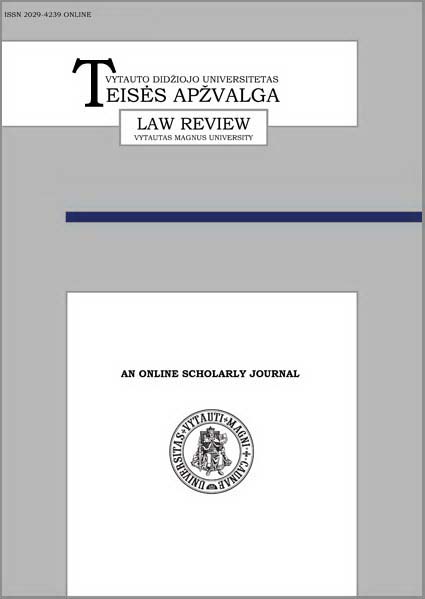Kai kurie vagystės kriminalizavimo probleminiai aspektai Lietuvos ir kitų užsienio šalių baudžiamuosiuose įstatymuose
Criminalization of Problematic Aspects of Theft in the Criminal Laws of Lithuania and Other Countries
Author(s): Andželika Vosyliūtė, Albertas MilinisSubject(s): Law, Constitution, Jurisprudence, Criminal Law, Court case
Published by: Vytauto Didžiojo Universitetas
Keywords: Theft; Criminalization; Property; Damage; Possession of property; Case law;
Summary/Abstract: Article is aimed to analyze theft, as it is foreseen in Article 178 (theft) of The Criminal Code of the Republic of Lithuania. The aim of this study is to reveal the advantages and disadvantages of criminalizing theft in Lithuanian criminal law and to submit proposals to the legislator regarding adding and amending features of the act. In order to achieve these goals, the following tasks are set: to provide a historical overview of the criminalization of theft, to perform a detailed analysis of the criminalization of theft in the criminal laws of Lithuania and other countries, to submit proposals to the legislator of the Republic of Lithuania regarding the establishment of a certain subjective features of theft, to find out whether it is necessary to expand the subject matter of the theft in Lithuanian criminal law.While trying to evaluate the current legal regulation established in the CC of Lithuania, at the same time the authors examine the criminal laws of other countries (Germany, Poland, Hungary, France, etc.)In their article, the authors also examine the identification of objective and subjective features in criminalizing theft. The authors point out that, for example, criminalization of theft in criminal law, in some countries, including Lithuania, name property of another (Latvia, Estonia, Poland, Russia, Italy, Australia, England) as theft, others a object of another (Germany, Hungary, France, Turkey), and still others (Canada and England) use a broader term to define the subject of theft - money, any other movable and immovable property, as well as the right of claim and other intangible property. Moreover, the authors point out that subjective features (motive and purpose) in criminalizing theft are not enshrined in Article 178 of the CC of Lithuania. Meanwhile, the criminal laws of some foreign countries also define theft as a sign of selfishness - seeking to obtain (material) benefits (Danish CC, Italian CC, Russian CC). The authors, having performed the analysis of legal acts, doctrine and criminal cases, present their conclusions in the article. The authors of the study found that: 1) after assessing the current legal regulation established by the CC of Lithuania, it is considered that the extension of the subject of theft is not expedient, but it is debatable regarding the narrower determination of the subject of theft; 2) unlike the CC of Lithuania, the definitions of theft provided in the laws of many countries also indicate the purpose of seizure (hijacking) of property of another: with the aim of misappropriation (Estonia, Germany, Poland, Hungary, Sweden, Turkey); 3) in the absence of an article of the CC of the Republic of Lithuania, regulating criminal liability for temporary use of a vehicle, it is more difficult to substantiate the purpose of embezzlement as a necessary feature of hijacking; 4) the Lithuanian legislator should define theft in Article 178 of the CC (theft) as the abduction of another's property with the aim of appropriation, which would ensure the principles emphasized by the Lithuanian Constitutional Court and the European Court of Human Rights that the legal description of an act as criminal in criminal law must be complete, accurate and include clear implementation.
Journal: Teisės apžvalga
- Issue Year: 2020
- Issue No: 2(22)
- Page Range: 40-59
- Page Count: 20
- Language: Lithuanian

